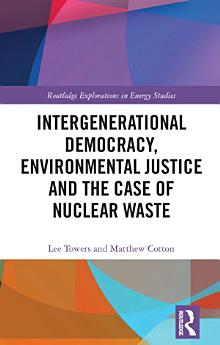Intergenerational Democracy, Environmental Justice and the Case of Nuclear Waste
About this ebook
Lee Towers and Matthew Cotton examine the issue of intergenerational justice from a social scientific perspective, drawing on central case studies of nuclear waste management in Canada, Finland, and the United Kingdom. They connect indigenous philosophies and notions of justice with the concept of intergenerational democracy, advocating for better inclusion of youth and elders in decision-making that affects their well-being. As such, the book’s primary objectives are fourfold:
- To assess whether trade-offs between intergenerational and intragenerational justice are necessary, and if so, what these trade-offs are and how they might be resolved.
To critically assess dominant western liberal philosophical approaches that shape contemporary intergenerational justice thinking in policy and practice, and consider alternatives drawn from anthropology and indigenous philosophies.
To assess how far our current capitalist system can achieve substantive forms of justice.
To critically examine three nuclear waste management case studies and assess how far these achieve environmental and energy justice and how they exemplify tensions between inter- and intragenerational justice.
This short, accessible volume will be of great interest to students and scholars of energy, environmental justice, and ethics.
About the author
Lee Towers is a postdoctoral researcher working at Teesside University looking into aspects of intra- and intergenerational justice and nuclear waste solutions. He holds a PhD in applied social sciences from Brighton University. This PhD explored energy justice with a focus on community energy organisations and their work on energy poverty and climate mitigation in the United Kingdom. Previous published work includes an examination of community energy work on reducing energy poverty in the UK privatised energy system and an exploration of the intergenerational aspects of the pandemic published by Brighton University. His current postdoctoral position is funded by the Nuclear Waste Services.
Matthew Cotton is professor of environmental justice and public policy in the School of Social Sciences, Humanities, and Law at Teesside University. He holds a PhD in environmental science from the University of East Anglia. His research explores the social and ethical dimensions of technology development and environmental planning, and the effective involvement of stakeholders in questions of socio-economic and ecological justice. His previous published works on these topics include the monographs: Virtual Reality, Empathy and Ethics; Nuclear Waste Politics (Routledge); and Ethics and Technology Assessment; and co-edited volumes: Governing Shale Gas (Routledge) and Engaging Environmental Justice. His research in the field of environmental justice is funded by Nuclear Waste Services; Research England; The Economic and Social Research Council; Euratom; The Foreign, Commonwealth and Development Office; and the National Institute for Public Health Research.





